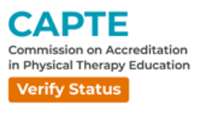 CHALLENGE
CHALLENGESummary of This Program
Neumann University’s Doctor of Physical Therapy Degree
Accredited by the Commission on Accreditation in Physical Therapy Education (CAPTE), Neumann University’s Doctor of Physical Therapy is a unique program of study that prepares the next wave of driven, impactful, and passionate physical therapy professionals.
The conceptual basis for the curriculum is the body systems model with the inclusion of course content in physical therapy science, clinical medicine, professional topics, research and evidence-based practice, administration and management, human development, education and consultation, and health policy topics, which expose students to broader aspects of the profession and the context for current practice.
At Neumann, you can expect to learn with and from ambitious, empathetic professionals who are gaining the skills needed to provide phenomenal patient care in the field of physical therapy, and you can be confident that you’ll enter the field ready to secure your dream career.
Doctor of Physical Therapy Degree | Features
- Weekend, on-campus format
- Can be completed in 3 years
- 95 credit hours
- CAPTE accredited
- 30 weeks of full-time clinical education experiences required
- Housed in Neumann University’s Health Sciences Center — with state-of-the-art laboratories and clinical standard equipment
Doctor of Physical Therapy | Learning Outcomes
The Doctor of Physical Therapy at Neumann University seeks to develop practitioners who:
- have an in-depth knowledge of the basic and clinical sciences, of client examination, testing, assessment, evaluation of examination data, diagnosis, prognosis, and intervention relative to patient/client management from the simplest to the most complex of patient conditions
- apply their knowledge to prevent, identify, assess, correct and/or alleviate acute or prolonged movement dysfunctions
- function in a clinical team atmosphere, within the family and social contexts, and within a changing health care environment
- make clinical decisions, prioritize treatment goals, delegate effectively and provide consultation as well as treatment
- appropriately refer patients/clients to other health care providers/agencies/resources
- identify and integrate sound research-based evidence for effective patient care
- recognize the need to be life-long learners who seek the information and experiences necessary to remain current and influence changes in health care policy, delivery and patient care management procedures
- recognize the need and requirement to measurably predict patient outcomes and structure their management strategies and procedures to achieve those outcomes safely, effectively, and efficiently
- identify, respect, and act with consideration for individual differences, values, preferences, and expressed needs in all professional activities.
Doctor of Physical Therapy | Required Courses
(95 Credits)
Required Sequence of Courses and Program of Study: 95 Credits
Note: This program of study presents the courses in sequence so that each semester builds upon the content and skills learned in the previous semester(s).
Year One: Summer Semester (9 Credits)
- PT 505 Gross Anatomy/Laboratory 5 Credits
- PT 518 Biomechanics and Kinesiology 4 Credits
Year One: Fall Semester (12 Credits)
- PT 512 Pathology, Pharmacology and Review of Systems 3 Credits
- PT 516 Fundamental Physical Therapy Skills 4 Credits
- PT 581 Research in Physical Therapy 3 Credits
- PT 740 Human Development 2 Credits
Year One: Spring Semester (13 Credits)
- PT 507 Neuroscience 4 Credits
- PT 508 Exercise Physiology 2 Credits
- PT 519 Physical Agents 4 Credits
- PT 583 Introduction to Evidence-based Practice 3 Credits
Total Credits for Year One: 32
Year Two: Summer Semester (11 Credits)
Year Two: Fall Semester (10 Credits)
- PT 619 Clinical Reasoning I 1 credit
- PT 626 Cardiopulmonary Physical Therapy 4 Credits
- PT 636 Neuromuscular Physical Therapy 5 Credits
Year Two: Spring Semester (12 Credits)
- PT 617 Musculoskeletal Physical Therapy II 3 Credits
- PT 665 Psychosocial Aspects of Patient Management 2 Credits
- PT 691 Clinical Education I 4 Credits
- PT 730 Health Policy Topics 2 Credits
- PT 742 Mentored Research Experience I 1 Credit
Total Credits for Year Two: 33
Year Three: Summer Semester (9 Credits)
- PT 655 Geriatric Physical Therapy 3 Credits
- PT 683 Tests and Measures in Physical Therapy 2 Credits
- PT 737 Neuromuscular Physical Therapy II 3 Credits
- PT 743 Mentored Research Experience II 1 Credit
Year Three: Fall Semester (13 Credits)
- PT 714 Wound Management 2 Credits
- PT 719 Clinical Reasoning II 1 credit
- PT 725 Musculoskeletal Physical Therapy III 2 Credits
- PT 731 Advanced Practice Topics 2 Credits
- PT 744 Mentored Research Experience III 1 Credit
- PT 760 Pediatric Physical Therapy 2 Credits
- PT 770 Prosthetics and Orthotics 3 Credits
Year Three: Spring Semester (6 Credits)
- PT 790 Clinical Education II 3 Credits
- PT 795 Clinical Education III 3 Credits
Total Credits for Year Three: 30
Doctor of Physical Therapy | Tuition
Tuition is now a flat, per-semester fee. The tuition is $10,450 per semester. For more information, visit the Office of Financial Assistance.
While Neumann is known for its competitive, affordable sticker price, we know that most graduates need financial assistance of some kind while enrolled in graduate school. For everything you need to know about your financial aid options, download our guide: Offsetting the Cost of Graduate School — Financial Aid for Graduate Students.
Doctor of Physical Therapy | Admissions Requirements
Applicants must submit official GRE test scores, a current resume, three (3) letters of recommendation, fifty (50) officially documented physical therapy hours and have completed all pre-requisites. Letters of recommendation should include two Physical Therapists and one outside source. Applicants must apply through PT-CAS.
- **Given the circumstances on COVID-19, we understand that many students are not able to fulfill the 50 required observation hours for the application. Please submit as many hours as possible, however, if you have 20 hours or below, you will need to watch this video and submit a 1-2 page essay outlining why Physical Therapy is a good career choice for you.
For more information on the admissions requirements for this program, visit our admissions page.
Neumann Accreditation
Program Outcomes
- The first time pass rate on the NPTE for the Class of 2023 is 62.5% and for the Class of 2024 is 75.8%. The average first time pass rate for both classes is 69.2%.
- The average ultimate pass rate (including retakes) on the NPTE for the Classes of 2022 and 2023 is 96.9%.
- The average graduation rate for the Classes of 2023 and 2024 is 92.9%.
- 100% of all licensed graduates from the Classes of 2023 and 2024 who responded to our survey or were otherwise contacted are employed as physical therapists.
- See program Fact Sheet Fall 2024 - Spring 2025 for additional program information.
- See program Financial Fact Sheet Fall 2024 - Spring 2025 for information concerning tuition, fees, and student debt.

The Doctor of Physical Therapy Program at Neumann University is accredited by the Commission on Accreditation in Physical Therapy Education (CAPTE).
Frequently Asked Questions
What Can We Answer For You?
What is a Doctor of Physical Therapy salary like?
The field of physical therapy is booming. In fact, it is predicted to grow by 21% over the next 10 years. Physical therapists also make an average of...
What is a Doctor of Physical Therapy salary like?
The field of physical therapy is booming. In fact, it is predicted to grow by 21% over the next 10 years. Physical therapists also make an average of $90,000 per year, proving it to be a lucrative career for professionals who obtain the Neumann DPT.
What jobs can you get with a Doctor of Physical Therapy degree?
Pursuing a Doctor of Physical Therapy degree can eventually lead to higher positions such as Clinical Director, Director of...
What jobs can you get with a Doctor of Physical Therapy degree?
Pursuing a Doctor of Physical Therapy degree can eventually lead to higher positions such as Clinical Director, Director of Rehabilitation, and Health Care Manager.
Where do physical therapists work?
Physical therapists can find work in a variety of settings including private offices, outpatient clinics, hospitals, patients’ homes, work settings, fitness...
Where do physical therapists work?
Physical therapists can find work in a variety of settings including private offices, outpatient clinics, hospitals, patients’ homes, work settings, fitness facilities, academic institutions, and nursing homes.
Why should you choose Neumann’s Doctor of Physical Therapy degree?
With small class sizes, expert faculty, and a required internship experience, Neumann University’s DPT program is perfect for future...
Why should you choose Neumann’s Doctor of Physical Therapy degree?
With small class sizes, expert faculty, and a required internship experience, Neumann University’s DPT program is perfect for future leaders in the field of physical therapy. With a weekend and on-campus learning format, students can achieve the DPT in just three years.
What kind of experiential learning opportunities does Neumann’s DPT provide?
Neumann currently holds contracts with 500 clinical affiliation sites, which means that there is absolutely a site that...
What kind of experiential learning opportunities does Neumann’s DPT provide?
Neumann currently holds contracts with 500 clinical affiliation sites, which means that there is absolutely a site that is the perfect match for you to learn through experience. Neumann DPT students are placed in clinical sites based on their learning needs and professional goals.
Within Neumann University’s DPT program, there are three required clinical experiences, which include outpatient and inpatient settings (may include specialty area or home care). Experiences cover all levels of patient acuity and across the lifespan with conditions and diseases involving all body systems commonly encountered by physical therapists.
What are some example courses?
Students are required to take courses, such as:
- Research in Physical Therapy
- Neuroscience
- Health Policy Topics
- Geriatric Physical Therapy
- Clinical Education
What are some example courses?
Students are required to take courses, such as:
- Research in Physical Therapy
- Neuroscience
- Health Policy Topics
- Geriatric Physical Therapy
- Clinical Education
Sport Business Alumna Named to Global Top 40
Hard work pays off. Just ask Ashley Dabb, who earned her MS in Sport Management in 2010. She was recently recognized at the Leaders Under 40 Awards,...
More Recent Posts

